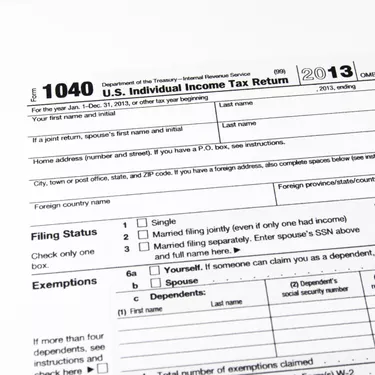
Whether you work for an employer or you are currently self-employed, you will be tasked with paying Social Security taxes every year. The amount of Social Security taxes you pay depends on how much money you make during a given year. The Social Security tax rate for 2021 is set to 6.2 percent. If you're in the midst of filing your tax return for the year, you may be wondering: Is Social Security withholding deductible? The answer depends on your employment status.
Video of the Day
When you work and earn a certain amount of money, your employer will invariably withhold some of your paycheck to pay state income taxes, payroll taxes and federal income taxes. While you may think the amount that's withheld from your paychecks is high, the truth is that the Social Security taxes that are withheld determine how much Social Security benefits you receive when you reach retirement age. While it's often impossible to deduct Social Security taxes from your tax return, you may have the ability to claim a credit on your next return.
Video of the Day
What Is Taxable Income?
Every year, Social Security tax is applied to a certain amount of your income. For most taxpayers, all income will be used when calculating Social Security taxes. However, there are limitations on the amount of income that count as taxable income. For the 2021 tax year, the maximum amount of taxable income is set at $142,800. This number is set to increase to $147,000 in 2022.
When taking the 6.2 percent Social Security tax rate into account, the maximum amount of Social Security taxes you could pay for the 2021 tax year is $8,854. If you happen to make $160,000 for the year, any income above $142,800 won't be taxed for Social Security withholding. If an employer withholds too much money from your paychecks, you can request that they provide you with a refund that covers the difference.
Read More: How to Calculate a Social Security Tax
If you are currently self-employed, Social Security taxes function differently. Because you're self-employed, an employer doesn't withhold taxes from your paycheck. The Social Security tax rate is 12.4 percent for self-employed individuals. Half of the Social Security taxes that you owe would normally be covered by an employer.
In this situation, you're able to deduct the portion of your Social Security taxes that is typically paid by your employer. This deduction is considered to be an adjustment to your total income, which means that the deduction can be claimed even if you don't itemize deductions.
Read More: Self-Employed Tax Deductions, Benefits and More
Calculate the Excess Withholding Refund
As mentioned previously, any income you make that's higher than $142,800 can't be taxed for Social Security. In the event that you work for at least two employers and have total earnings higher than the threshold, it's likely that too much of your income will be withheld since neither employer is aware of how much the other is taxing you.
Let's say that you earned $125,000 from one employer and $50,000 from another employer. Both employers may withhold taxes on your entire income, which means that you would be taxed on $175,000 as opposed to the cap of $142,800. It's possible to claim this excess withholding amount as a credit when you file your income tax return.
Even though Social Security taxes typically aren't deductible from your taxable income, there are many deductions and tax credits you can claim to reduce the amount of taxes you pay for the year.
Social Security Tax When Self-Employed